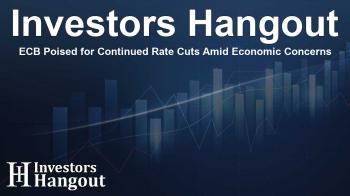ECB Poised for Continued Rate Cuts Amid Economic Concerns

ECB Forecasts More Rate Cuts Amidst Economic Challenges
The European Central Bank (ECB) is reportedly set to keep cutting interest rates, a strategy aimed at safeguarding the euro zone economy from looming uncertainties. This anticipated move is viewed through the lens of recent economic developments and market reactions.
Understanding the Impact of Tariffs
Concerns are rising about the implications of potential tariffs introduced by the U.S. administration. Economists have speculated that a proposed minimum tariff of at least 10% on all imported goods could create significant tremors in the financial markets, exacerbating the already delicate condition of the euro zone.
ECB’s Approach to Economic Stability
Under the leadership of Chief Economist Philip Lane, the ECB faces the challenge of crafting a policy that stabilizes the economy without triggering a recession. Managing inflation becomes critical, especially as the rates have shown a recent uptick, which necessitates a careful balancing act.
Germany and France in Political Turmoil
Key economies in the euro zone, particularly Germany and France, are experiencing a phase of political instability, contributing to sluggish economic activity. The contraction of Germany's economy by 0.2% has left the euro zone in a vulnerable position, as indicated by various economic indicators.
A Look Back at the ECB's Easing Strategy
The ECB launched its easing initiatives in June 2024, signaling a proactive approach to maintaining economic stability through interest rate cuts. Throughout the year, the bank implemented four cuts, setting the stage for further reductions.
Predictions from Economists Surveyed
A recent poll encompassing 77 economists provided some forecasts for the ECB's upcoming actions. With a strong consensus, a 25 basis point reduction in the deposit rate to 2.75% is anticipated by the end of January. Furthermore, 60% of those surveyed foresee an additional three cuts by mid-year, which could lower the rate to 2.00%.
Diverse Predictions for Future Rates
The remaining economists presented differing views, predicting end-Q2 rates that range from 1.75% to 2.50%. The median assessments suggest that the deposit rate will stabilize around 2.00% until at least mid-2026.
Market Expectations Versus Federal Reserve Moves
Current market behaviors reflect a complete anticipation of a rate cut this month, with expectations of approximately 90 basis points of reductions throughout the year. This stands in stark contrast to the U.S. Federal Reserve's more cautious approach, which projects only one 25 basis point reduction due to inflationary pressures.
Projected Growth Rates for the Currency Union
The poll further suggests that the 20-member currency union is looking at a growth rate of about 1.0% for the current year and an increase to 1.2% for the next. As economic forecasts are made, these growth rates will be closely monitored by both policymakers and investors.
Inflation Trends and Predictions
The euro zone witnessed an inflation rate of 2.4% recently, which many experts believe is likely transitory. Projections indicate a decrease in inflation toward the ECB's targeted rate of 2.0% in Q2, expected to stabilize around this figure through mid-2026.
Reassessing Inflation Expectations
Economists display a level of uncertainty regarding inflation trends. A majority, with 20 out of 34 experts, predict a likelihood of inflation exceeding initial estimates. This sentiment reveals the challenges that lie ahead for the ECB in managing economic stability.
Frequently Asked Questions
What is the ECB's current strategy for managing interest rates?
The ECB plans to continue cutting interest rates to protect the euro zone economy from external pressures, especially from potential tariffs.
How many interest rate cuts are expected by mid-year?
Economists anticipate three additional cuts, potentially lowering the deposit rate to 2.00%.
What are the challenges facing the euro zone economies?
Political instability in leading economies like Germany and France is contributing to slower economic activity.
How does the ECB's approach differ from the U.S. Federal Reserve?
The ECB is expected to implement multiple rate cuts, whereas the U.S. Federal Reserve is projected to make only a single cut this year.
What growth rates are forecasted for the euro zone?
The euro zone is expected to grow by 1.0% this year and 1.2% the following year.
About Investors Hangout
Investors Hangout is a leading online stock forum for financial discussion and learning, offering a wide range of free tools and resources. It draws in traders of all levels, who exchange market knowledge, investigate trading tactics, and keep an eye on industry developments in real time. Featuring financial articles, stock message boards, quotes, charts, company profiles, and live news updates. Through cooperative learning and a wealth of informational resources, it helps users from novices creating their first portfolios to experts honing their techniques. Join Investors Hangout today: https://investorshangout.com/
Disclaimer: The content of this article is solely for general informational purposes only; it does not represent legal, financial, or investment advice. Investors Hangout does not offer financial advice; the author is not a licensed financial advisor. Consult a qualified advisor before making any financial or investment decisions based on this article. The author's interpretation of publicly available data presented here; as a result, they should not be taken as advice to purchase, sell, or hold any securities mentioned or any other investments. If any of the material offered here is inaccurate, please contact us for corrections.
